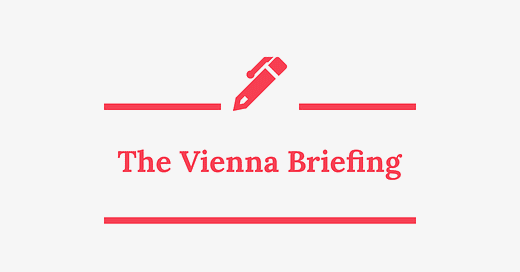When Push Comes To Shove
Chancellor Karl Nehammer has ruled out taking the ÖVP into coalition with the far-right FPÖ if it would mean making Herbert Kickl chancellor
Servus!
Parliament is in recess, the news cycle is slowing, and Austria’s politicians are using their summer downtime to tour the country, warming up for parliamentary elections due in 2024. Chancellor Karl Nehammer began his journey around the country’s nine states last week in St. Johann im Pongau. The federal government has designated this town in rural Salzburg the future home of an operations center for the European Sky Shield Initiative, a common European air defense program Austria has declared its intention to join.
The government’s Sky Shield plan has come under fire from the far-right Freedom Party (FPÖ), which believes the move would violate Austria’s permanent neutrality. Nehammer’s contention is that guarding Austria’s neutrality requires the country being able to defend itself, and Sky Shield would be part of that defensive posture. Writing in the Standard, Eric Frey argues joining Sky Shield—which is a military alliance, albeit a defensive one—does constitute a decisive shift in Austrian foreign policy vis-à-vis its own neutrality. To the extent that a broken clock is right twice a day, the FPÖ has a point on this one.
In defending his position on Sky Shield, Nehammer went further, describing FPÖ leader Herbert Kickl as a Russian propagandist and a “security risk” for Austria. “Chancellor and Kickl are mutually exclusive terms,” he told journalists emphatically, ruling out a coalition with the FPÖ if the result were Kickl becoming chancellor. Discussing Kickl’s time as interior minister during the 2017-2019 People’s Party (ÖVP)-FPÖ coalition1, Nehammer said one can “see what happens when democracy falls into the wrong hands.”
Going into coalition government with the FPÖ hasn’t been taboo for the ÖVP for more than 20 years now. The ÖVP went into coalition with the FPÖ at the national level in 2000, 2002, and 2017, and the two parties currently govern together in three states: Upper Austria, Lower Austria, and Salzburg. Indeed, Nehammer explicitly did not rule out an ÖVP-FPÖ coalition in the future—only a situation that made Kickl chancellor. On this last point, the ÖVP is very much divided, with cabinet ministers and party grandees already indicating their intention to step down or leave the party were the ÖVP to act as Kickl’s handmaiden.
Back in 2000, then-FPÖ leader Jörg Haider stepped aside and gave up a chance at the vice-chancellor post in order to enable an ÖVP-FPÖ government. The ÖVP would dearly love something similar to happen after the next election were an ÖVP-FPÖ coalition possible, with Kickl making way for a more amenable chancellor or vice-chancellor figure like former FPÖ leader Norbert Hofer or Upper Austria lieutenant governor Manfred Haimbuchner. The turn of the millennium, however, was a different political age, and I’m unconvinced that Kickl can be made to give up power so easily.
First, the FPÖ are currently leading in the polls on 30 percent ahead of the ÖVP on 24 percent. Unlike in 2000, when the parties were separated by a hair, the ÖVP has very little leverage over the FPÖ. Second, since 2000, far-right populist parties have become a normalized part of the political system; the notion of chancellor Kickl is no longer as shocking as it once was considering Viktor Orbán has been Hungary’s prime minister since 2010. Third, Kickl is more politically and ideologically rigid and hard-headed than Haider—a man on a mission determined to become Austria’s Volkskanzler, ‘people’s chancellor.’ And fourth, the ÖVP is already in coalition with some of the worst elements of the FPÖ in Lower Austria. If it can make peace with Udo Landbauer, now lieutenant governor there, then it could form a government with Herbert Kickl too.
Bis bald!
Thank you for subscribing to the Vienna Briefing. If you know someone who might be interested in receiving this newsletter, consider sharing it with them today.
The Vienna Briefing is a reader-supported publication. If you would like to support my work, think about sending me a tip via PayPal. Thank you to all contributors.
Emissions Reduction
Greenhouse gas emissions in Austria fell by 6 percent year-on-year in 2022, a year in which the economy reopened as pandemic restrictions were phased out. The reduction comes after a year, 2021, in which emissions grew.
All Eyes On Vienna
Austria is a “veritable aircraft carrier” of illegal Russian agents at the heart of the continent, a senior European spymaster has told the Financial Times. Russia’s signals intelligence operation in Vienna is its most important in Europe, the paper reported.
Shock Poll In Lower Austria
The FPÖ would win state elections in Lower Austria were a vote held this Sunday, a new poll shows. The survey conducted by pollster Peter Hajek had the far-right on 31 percent ahead of the ÖVP on 30 percent.
Nehammer served as ÖVP party secretary during that time and was not a cabinet minister.



